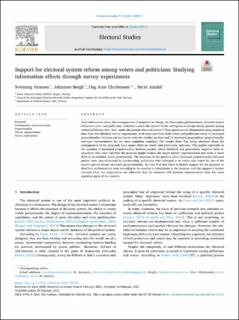Support for electoral system reform among voters and politicians: Studying information effects through survey experiments
Peer reviewed, Journal article
Published version
Permanent lenke
https://hdl.handle.net/11250/2837945Utgivelsesdato
2021Metadata
Vis full innførselSamlinger
- Publikasjoner fra CRIStin [721]
- Tidsskriftpublikasjon [391]
Originalversjon
10.1016/j.electstud.2021.102313Sammendrag
Does information about the consequences of proposals to change the Norwegian parliamentary electoral system influence voters’ and politicians’ attitudes towards the system? Is the willingness to accept change greater among voters/politicians who “lose” under the present electoral system? These questions are illuminated using empirical data from two identical survey experiments, with responses from both voters and politicians about 1) increased proportionality between parties (more seats for smaller parties) and 2) increased geographical proportionality (stronger representation for the more populous counties). The results show that being informed about the consequences of the proposals has a major effect on voters’ and politicians’ attitudes. This applies especially to the question of increased proportionality between parties, where feedback was particularly negative from respondents who were told that the proposal might weaken the larger parties’ representation and make it more difficult to establish viable governments. The responses to the question about increased proportionality between parties were also influenced by partisanship; politicians who belonged to or voters who voted for one of the smaller parties favour increased proportionality. We also find that there is limited support for the proposal to distribute parliamentary seats according to the number of inhabitants in the counties, and this support is further reduced when the respondents are informed that the measure will increase representation from the more populous parts of the country.
